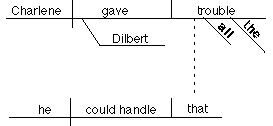Relative
Pronouns, adjectives, and adverbs
[Note: The word that has many functions. It can
be a determiner (I like that truck),
a pronoun (That seems wrong), or a
relative (Elvis likes the pie that
Ivy made). Look at function to determine which sort of that you are
dealing with.]
Although relative pronouns are a kind of pronoun, and relative
adverbs a kind of adverb, like the conjunctive adverb relatives also serve a
dual function as a sort of conjunctive.
Relatives connect clauses to the words they modify within a
sentence.
Relative clauses mostly act as adjectives.
[What’s the difference between a clause and a phrase?
A phrase contains no finite verb. (The obvious exception is verb phrases.) A
clause contains a finite verb as well as a subject. A finite verb is any
conjugated verb – any verb that could be the main verb in a sentence.]
Relative clauses: Examples
The truck
which Elvis bought is
an orange Ford.
Which is the
relative pronoun; it connected the dependent clause which Elvis bought
to the word it modifies (truck).
Relatives have a function both within and without their
clauses. Within their clause, they serve as a noun or an adverb in the
subordinated “sentence.” Outside the clause, they link to and thus take as an
antecedent some noun (almost always) in the main sentence.
The truck
which Elvis bought is
an orange Ford.
Elvis bought [which/the truck]
Here, the subordinated sentence is “Elvis bought [the truck].”
So which is clearly acting as an
object in the subordinated sentence. It is thus a relative pronoun. As a
pronoun, it takes truck as its antecedent. That is also the word it modifies,
meaning that this relative clause functions as an adjective.
The child
who won got the
tickets.
Here, the subordinated sentence is “[she] won.” The word who, our relative, is thus a pronoun,
and it acts as the subject of the subordinated sentence. It takes child its antecedent, and thus
functions as an adjective.
Relative adverbs:
The
summer when Lily met Celia
was very hot.
We
visited the town where my
mother was born.
Here, we have a subordinated sentence, “Lily met Celia
[then],” which shows us that the relative word when is an adverb. Notice the antecedent is still a noun, and so
this relative clause still functions as an adjective.
Reed-Kellogg diagramming and relative clauses:
People who live in glass houses shouldn't throw stones:


No comments:
Post a Comment